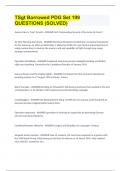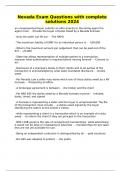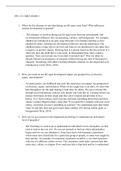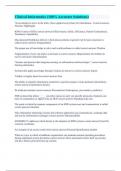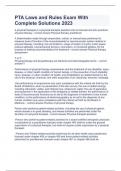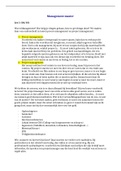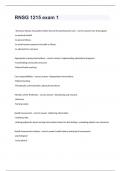Criminal Law – Sexual Offences
What legislation is the crime of rape set out in, and what are the actus reus and mens rea
requirements for rape?
Rape Section 1 of Sexual Offences Act 2003:
/////////////////////////// Actus Reus Mens Rea
Conduct Element Penile Penetration of V’s Intention to penetrate
vagina, anus or mouth
Circumstance Element V does not consent D lacks a reasonable belief in
consent
Result Element None None
Why is penile penetration considered worse than penetration with a foreign object?
There are additional risks associated with penile penetration such as unwanted pregnancy
and sexually transmitted disease.
Using legislation, describe what counts as a ‘penis’ and a ‘vagina’
Under section 79 (3), a penis will include surgically constructed penis’, allowing a
conviction where D is a post-operative transsexual.
Section 79 (3) also clarifies a vagina includes surgically constructed vaginas.
When / how can women be liable in a rape case?
Women cannot be the principal offender as they do not have a penis.
However, women can be accessories to rape where they assist or encourage a man to
commit rape.
Using the legal nature of penetration, describe what will and will not constitute penetration
Penetration need not be substantial or repetitive.
The requirement for vaginal penetration will be satisfied even where D has only
penetrated the vulva.
Penetration is a continuing act from entry to withdrawal. This can be important where D
penetrates V with consent but fails to withdraw after that consent is removed. Ie remove
before ejaculation.
This means an offence can occur at any point from entry to withdrawal.
How does age and marital status effect rape?
As long as D is over the age of 10 (criminal responsibility age) he is capable of committing
the offence on V of any age.
Marital rape was only confirmed as rape in 1991, and only through the courts. However,
since the SOA 2003, these issues no longer exist.
What must be analysed to satisfy the actus reus of rape and what case illustrates this?
, Penile penetration with consent is legal. Therefore, to satisfy the actus reus of rape our
focus must be on the subjective mind of V.
The case of McFall illustrates this well: D kidnapped V and D indicated he wanted to have
sexual intercourse with her. She agreed fearing for her safety if she refused. She faked
enjoyment but D was still charged with rape.
Crown Court ruling: despite outwards signs, V was not subjectively consenting.
Is there a legal definition of consent? Where in legislation is consent conceptualised?
Consent is defined within the Sexual Offences Act 2003 and is spread across 3 sections.
Section 76: contains a set of conclusive presumptions of non-consent: sets of facts which,
if proved, will be enough to establish non-consent.
Section 75: a set of ‘evidential presumptions’ of non-consent: sets of facts which if proved,
require D to provide some counter evidence to prevent a finding of non-consent.
Section 74: a general definition of consent.
When assessing a problem question, how should you approach the issue of consent?
Always begin with the presumptions of non-consent. If your facts come within the
conclusive presumptions then non-consent can be found without further discussion
If they come within the evidential presumptions then you can say a finding of non-consent
is likely unless D provides some evidence to the contrary.
Only discuss the general definition if the presumptions do not apply or where an evidential
presumption might be rebutted.
Section 76 – Conclusive Presumptions
Section 76 states that intentional deception as to the nature or purpose of the act will fall under
the conclusive presumption of non-consent, what do these terms mean?
V is deceived to the nature of the act where she is misled as to the physical mechanics of
the act, she is deceived as to the purpose of the act where she is misled as to why it should
happen.
What cases demonstrate deception clearly?
Williams (1923) – a singing teacher deceived his 16-year-old student into having sexual
intercourse telling her it was a procedure to improve her singing voice. D was charged with
rape.
D did not understand the dynamics of sexual intercourse so the court could find deception
as to the nature of the act.
Even if V had understood the act, it was done for the purposes of D’s sexual gratification
and not to improve V’s singing voice.
What deception will not be sufficient to find non-consent but will be for bodily harm?
If V understands the basic dynamics of the sexual act, deception as to associated risks will
not be sufficient to engage the conclusive presumptions.
Which case relates to these risks?
The risk of sexual infection has arisen in:
, Dica (2004) – D, knowing he was HIV positive had unprotected sexual intercourse with two
victims, infecting both. Neither victims knew of D’s positive status when they consented.
Court ruled: guilty of offence against the person not rape.
Court of Appeal: allowed an appeal but the court clarified that a lack of knowledge about
D’s infection did not amount to deception as to the nature of the act. There was no rape.
Although conclusive presumptions cannot be affected in Dica, the deception as to D having
HIV may be relevant to the general definition of consent.
What case demonstrates the limits of purpose of the act?
Linekar (1995) – D had sexual intercourse with a prostitute (V) having promised to pay her
£25. D never intended to pay her. D was charged with rape on the basis that V would not
have consented had she knew D was not going to pay her.
Initially D was convicted of rape, but on appeal it was determined that consent was not
negated by D’s deception.
The Court of Appeal recognised V would not have consented without payment promise,
but held that consent remained effective as she was not deceived as to the nature of the
act (she knew D would penetrate her vagina) or the purpose of D doing so (for his sexual
gratification.)
Which case demonstrates a pocket of clarity in relation to the importance of D’s motives when
finding consent or non-consent?
Devonald (2008) – V (16 year old boy) was in a relationship with D’s daughter. D believed V
had treated his daughter badly and sought revenge by posing as a young girl online and
persuaded V to masturbate in front of a webcam. D was planning to use this video to
humiliate the boy.
Crown Court: guilty of sexual offence. Section 76 presumption applied V was deceived as
to D’s purpose in relation to the sexual act. Conviction upheld on appeal.
What is the second scenario besides nature and purpose that will trigger conclusive presumptions?
Where D intentionally deceives V as to his identity. Identity deception will only come
under the conclusive presumption when D imitates someone known to V.
It will not apply where D pretends to have certain attributes or qualifications or even
where he pretends to be someone not known to V (ie a celebrity). Such instances will be
decided under section 74 general definition of consent.
Section 75 – Rebuttable Presumptions of Non-Consent
What is a rebuttable presumption?
Rebuttable presumptions do not establish a lack of consent. Rather if the facts come
within the rebuttable presumptions, then the jury will find a lack of consent unless D
provides evidence to rebut the presumption.
How will the presumption apply?
It must be established that certain facts arose, and also that D had knowledge of those
facts.
Importantly, the prosecution does not need to demonstrate that those facts caused V’s
lack of consent. For example, if violence was used, the rebuttable presumption will apply
whether or not V would have consented without violence.
, How must D carry out the rebuttal to these types of facts that come under S.75?
D’s rebuttal doesn’t necessarily require D to deny the facts themselves, (eg deny violence
was used) it is enough for D to deny the implication that such facts demonstrate a lack of
consent.
For example, in the case of violence: D could argue sadomasochistic sexual encounters and
V consented to both violence and penile penetration. This demonstrates why violence
suits a rebuttable rather than conclusive presumption.
Which section of legislation provides 6 scenarios where rebuttable presumptions of non-consent
will arise?
Section 75 (2).
Section 74 – The General Definition of Consent
When does section 74 apply?
Many of the clearer cases of non-consent will be dealt with under S.75 or S.76. Where
these presumptions don’t apply, section 74 is used.
Use a case to demonstrate the necessity of section 74.
Jheeta (2007) – D sent V anonymous text messages over several years purporting to be
from the police, telling her to continue having sexual relations with him in order to avoid
fines for causing distress.
Crown Court: guilty of rape: D’s deception undermined V’s apparent consent.
Court of Appeal: conviction upheld on appeal.
Although S.74 leaves discretion to the jury, what clarifications does it provide?
The construction of ‘agrees by choice’ is a clear indication consent should be viewed as a
positive sign of willingness, as opposed to the absence of objection.
Secondly, two factors are highlighted to decide whether consent from V should be legally
effective. These factors are freedom and capacity.
What case describes the issue of reluctant consent and whether this constitutes agreement by
choice?
Watson (2015): in this judgement, the trial judge stated consent would be present if a
complainant had the freedom and capacity to make a choice and exercised that choice to
have sexual intercourse.
The trial judge also stated that consent could range from willing enthusiasm to reluctant
acquiescence. No fault was found with this part of the judgment.
However, the judge also asked the jury to consider whether the complainant was freely
consenting or submitting to a demand she felt unable to resist. It was held that a person
may feel unable to resist but not lack the freedom to make the choice; they reluctantly
consent.
Describe capacity and what is necessary to prove V possessed the capacity to consent.
V must be able to understand the choice of consent, meaning V must possess the sufficient
mental capacity to make such a choice.
When assessing capacity, the test is specific to the individual and occasion.


